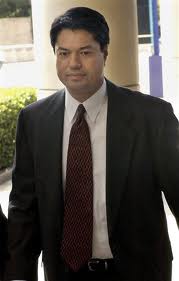 U.S. District Judge Sim Lake resentenced Jamie Olis to six years in prison this afternoon (Olis has already served about 2.5 years in prison) in the latest chapter of the three year saga that has become arguably the starkest example government’s dubious criminalization of business during the post-Enron era.
U.S. District Judge Sim Lake resentenced Jamie Olis to six years in prison this afternoon (Olis has already served about 2.5 years in prison) in the latest chapter of the three year saga that has become arguably the starkest example government’s dubious criminalization of business during the post-Enron era.
During the hearing, Judge Lake read portions of a lengthy opinion that he has written on the Olis resentencing. Although Judge Lake found that a sentencing guidelines sentence for Olis would be in a range of 151-188 months based on an estimated $79 million damage amount (the intended tax benefit to Dynegy from Project Alpha), he concluded that Olis deserved a non-guidelines sentence because of Olis’ exemplary character, the fact that Olis did not personally gain from Project Alpha, and that Dynegy did not fail as a going concern as a result of the transaction.
Judge Lake also concluded that the extensive publicity relating to Olis’ case and other recent white collar business cases has sufficiently informed the business world of the severity of fraudulent business conduct that principles of general deterrence do not require a guidelines sentence.
Although six years is a harsh sentence, my initial reaction to Judge Lake’s decision (before reading it) is that it would be very difficult to mount an effective appeal on Olis’ behalf to reduce the sentence.
On the other hand, the prosecution — exhibiting a lack of judgment that has become routine during this era of criminalizing business — announced at the end of the hearing that it intends to appeal Judge Lake’s opinion to the Fifth Circuit.
Frankly, I hope the government does appeal the sentence. That utter lack of prosecutorial discretion might be the only way to prompt the Fifth Circuit to take a whack at reducing Olis’ sentence further.
Update: Doug Berman, Ellen Podgor and Larry Ribstein, all of whom have blogged extensively on the Olis case, add their initial thoughts.
Professor Podgor’s point about the disparity between Olis’ sentence and the sentences of his co-defendants who copped pleas is particularly insightful.
Judge Lake notes in this opinion that this disparity in treatment between cooperating defendants and defendants who assert their innocence is a mechanism that Congress has adopted to facilitate cooperation in federal criminal investigations. But what looks good in theory has become ugly in practice.
Given the government’s overwhelming resource advantage and the willingness of prosecutors to appeal to jurors’ resentment to obtain convictions, asserting innocence in white collar criminal cases has become a risk that is too huge to take.

Olis sentence reduced to 6 years
At least partially rectifying one of the worst injustices in the recent annals of corporate crime prosecutions, Judge Sim Lake has reduced Jamie Olis’s sentence from 24 years to 6. Olis has already served two years and four months, and
I am hoping that Judge Lake got it right — in the sense that this was the lowest sentence he could mete out that would be upheld on appeal. In my view, Olis deserves an even lower sentence, but to do so risks near-certain reversal. Mind you, it’s no shoo-in that this sentence will be upheld.
I continue to be dismayed at this blog’s reference to “dubious criminalization of business.” As far as I can tell, Olis did commit an actual crime, and it’s sophistry to claim otherwise. Has he been over-punished for it? Yes. Is he innocent? No.
Mark, Olis was convicted of a crime for doing what he was told by his superiors. The transaction that he worked on is not clearly fraudulent. He asserted his innocence, and the government responded to that assertion by threatening Dynegy with indictment (and certain insolvency) if the company backed Olis or even just paid his defense costs. The company served Olis up on a platter, his superior turned on him in order to cop a plea and a nominal prison sentence for himself and Olis was not able to afford a top notch legal team. Accordingly, he was poorly represented at trial as the prosecution appealed to the jurors’ resentment and scapegoating of Enron-type businesspersons in demanding a harsh sentence for him. As a result, Olis was convicted of multiple crimes that bear little relation to his actual conduct.
Sadly, Mark, Olis’ plight is not an isolated one. Take a look through the criminalization of business category of this blog and you will be confronted with many other examples of businesspersons being prosecuted for crimes simply because they took risks that they thought would benefit the company and its shareholders. The implications of this thinly-veiled regulation of business are far reaching, and few of them are good. As Professor Ribstein has noted many times, trials of businesspersons have been turned into a sort of lottery, which is not a rational application of our criminal justice system.
Thanks for reading Clear Thinkers.
I think Tom Kirkendall deserves a great big pat on the back and more for championing justice for Jamie Olis and playing a significant part in containing this tragedy. It took a while for his clear thinking on this matter to seep into the mainstream press, but it eventually did. Do judges consider what they read in the press? You bet they do. Thank heavens some of what they read, like Tomís work, is worthy of their consideration. Bravo Tom.
Were this important issue getting the in depth coverage it deserved, there would be more than just a handful of comments left on your Olis and Enron updates. I am dismayed that the public has simply shrugged its shoulders and said, “Poor Jaime”.
Featured on BuzzTracker